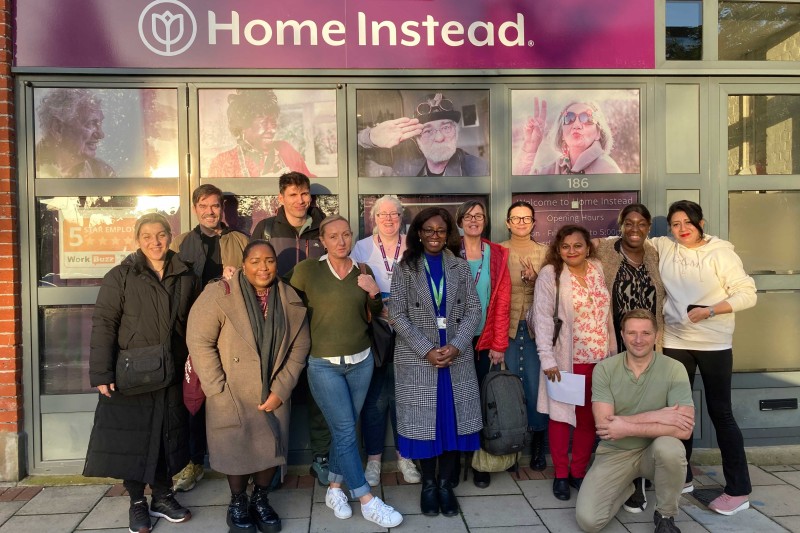A new research project is supporting people with dementia receiving home care with their eating and drinking.
The TOMATO project (nuTritiOn and deMentia AT hOme) is led by Bournemouth University working in collaboration with the Homecare Association, Leeds Beckett University and Universities of Leeds and Exeter and Leeds Community Healthcare NHS Trust.
 Dr Gladys Yinusa with staff from Home Instead
Dr Gladys Yinusa with staff from Home InsteadThe study, funded by National Institute for Health and Care Research (NIHR), seeks to work together with home care professionals, people with dementia and family carers to improve nutritional care for people living with dementia at home.
Discussions with family carers, health care professionals and home care professionals revealed that eating and drinking in dementia is a significant area of concern.
Principal Investigator Professor Jane Murphy, Deputy Dean for Research and Professional Practice in the Faculty of Health and Social Sciences at Bournemouth University, said: “Good nutrition is vital to support the health and wellbeing of people with dementia, as eating and drinking can be challenging and weight loss is common.
“It’s a privilege to be working together with amazing home care organisations from different regions across the country and through our research provide new knowledge, insights and approaches to help improve nutritional care to impact the lives of people living with dementia and their carers.”
 Professor Jane Murphy (second left) and Dr Gladys Yinusa (far right) with staff from GoodOaks Homecare
Professor Jane Murphy (second left) and Dr Gladys Yinusa (far right) with staff from GoodOaks HomecareThe study is being carried out in two phases, involving home care organisations from across Greater London, West Yorkshire, North West England and the South West.
The first phase involved a series of discussions with people living with dementia, their family carers, home care professionals, and consultation with nutrition experts to adapt the existing approach previously undertaken in care homes for a home care setting.
Besides adapting the content, language, and images to fit the homecare setting, stakeholders specifically wanted a handy guide for home care professionals and family carers that would be easily accessible and serve as a quick reference resource.
Informed by these conversations, a prototype resource has now been developed for home care professionals and family carers and friends.
As part of the second phase of the study, face-to-face and online nutrition awareness training is being delivered to home care professionals from four participating home care organisations - Westmorland Homecare, Love In Care, GoodOaks Homecare, and Home Instead.
The training will help them use the adapted intervention and evaluate its suitability for people living with dementia and family carers. The training has been supported by the NIHR Clinical Research Network (CRN) Wessex Delivery team.
Dr Gladys Yinusa, Post-Doctoral Research Fellow at Bournemouth University and NIHR DEM-COMM Dementia Research Fellow (NIHR ARC Wessex), who is working on the project, said: “Home care professionals play a significant role in supporting people living with dementia who receive home care. With training and appropriate resources, they are well-positioned to deliver improved nutritional care to the clients they support.”
Maddy Alemayheu RGN, Director at Home Instead Hammersmith & Chiswick, said: “One of the challenges of supporting people living with dementia is ensuring optimum nutrition at every stage of the condition; given this challenge, nutrition and dementia is a subject close to our heart. Participating in Project TOMATO is an incredible opportunity for both our organisation and our team.”
Kelsey Walmsey, Registered manager at Westmorland Homecare, added: “Westmorland Homecare are always looking for innovative ways to support our clients to the best of our ability.
“We are passionate about keeping people at home safely, good nutrition and hydration are key part of this, and we look forward to seeing the positive impacts that we are sure this research will have for individuals living with dementia.”



